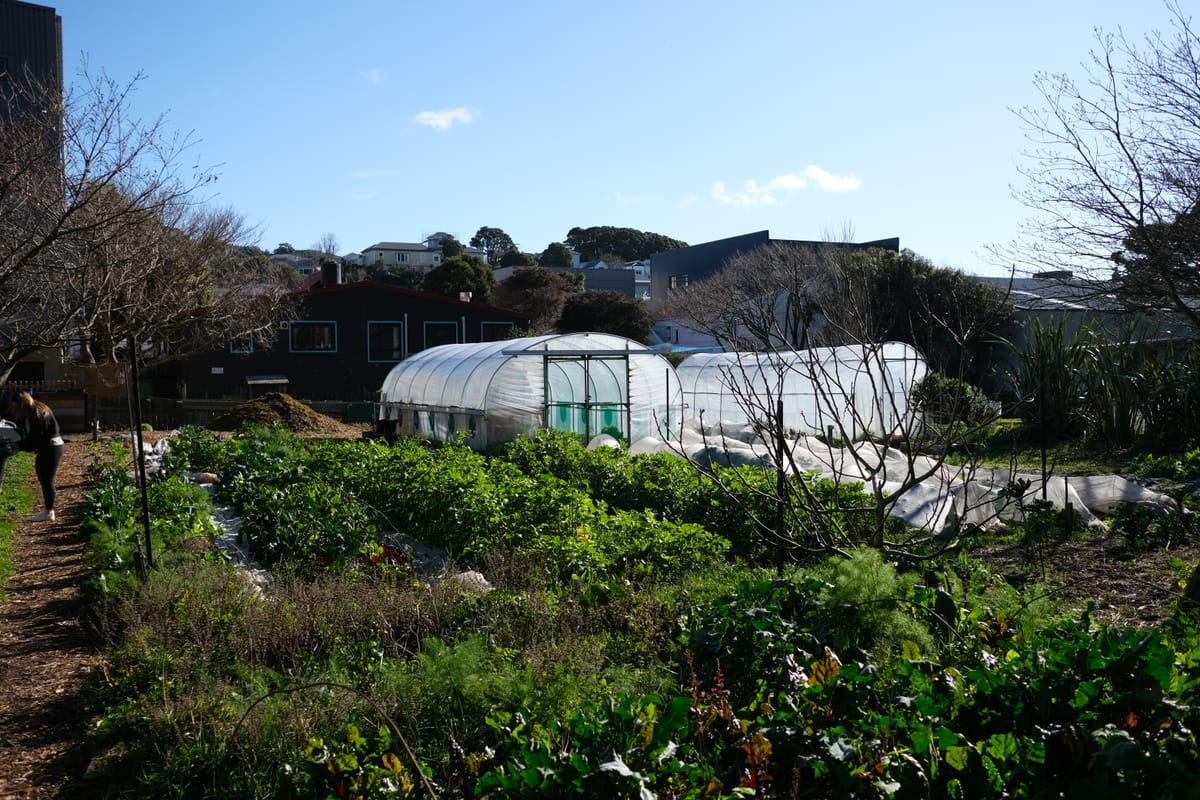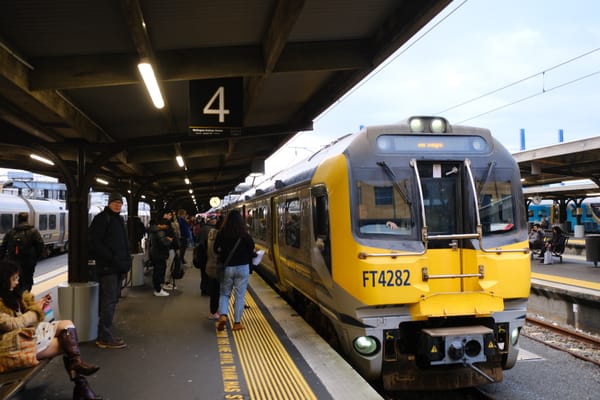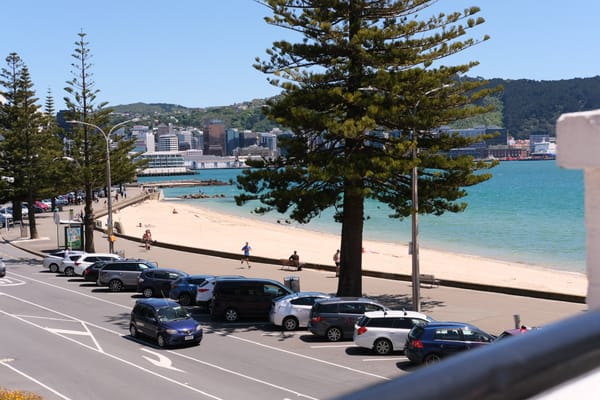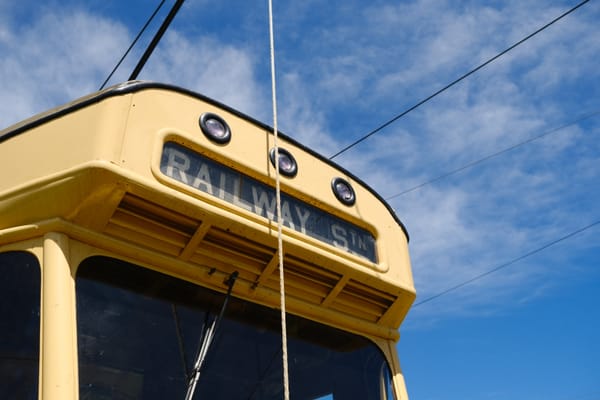Meet Kaicycle – the farm hidden in the centre of Wellington.

Next time you’re in Newtown, take a walk down Hospital Road. Nestled near the Blood Service and behind a kindergarten is something you wouldn’t picture in the central city: a farm.
What was an underutilised bit of council land has become a thriving spot for growing kai and composting scraps. It’s all because of the kaimahi and volunteers at Kaicycle.
Kaicycle is a charity focused on community gardening in the central city. They take food scraps and turn it into gorgeous compost in a public garden to donate and grow food.
I’ve been composting with Kaicycle for nearly four years – and wanted to learn about them. So, I chatted with their generous community manager Rose on a bright winter day to learn how powerful growing food in the city can be.

Kaicycle is filling some gaps in Wellington’s waste collection.
Wellington City doesn’t collect kerbside food scraps. Instead, we send wasted food to landfill – 30,000 tonnes a year in fact.
Composting is a great alternative to landfill. Any kai that’s binned pollutes into the air because food buried in landfill belches methane. Half of food waste happens at home – so we all have the power to stop that methane being made.
For city dwellers, composting can be hard. My partner and I are apartment dwellers with no balcony – so we have no access to our own garden. Kaicycle makes it easy for people like us to compost. We pay $20 a month to drop our scraps off – and they turn it into high quality compost.
They also collect food scraps from businesses by bike. Their mahi allows people and businesses to stop food from entering landfill, and instead support a public garden.
Rose told me their 12 staff and 160 volunteers created about 40 tonnes of compost last year. This year, they’re trying to double that. Their new hot composting machine has unlocked the ability to compost up to 90 tonnes a year. I never grasped how much their small team was achieving.

Urban farms benefits community and our connection to whenua.
During our chat, people were enjoying the garden. A family dropped off scraps. Someone took a walk around. Another ate their lunch near the crops. The place buzzed with people.
Lots of hospital workers take their lunch break in the garden. The land is owned by the Council, and Kaicycle maintains a kaupapa of openness and community. Anyone can visit any time. Wellington’s natural spaces are hard to enjoy from the CBD. City parks are few and far between – and our streets have very few trees. Imagine if we had more green spaces where people could garden – the mental health benefits would be fantastic.
Rose told me that their volunteers get a deep sense of fulfilment from their mahi. For disillusioned Wellingtonians, it’s a perfect way to do something real. Worrying about the world in isolation sucks, but volunteering connects people to countless others dedicating their lives to improving our environment.
Kaicycle works hard to be a good partner for Māori.
When I walked the whenua with Rose, she told me what the land was like before colonisation. There was an awa (river) that went through the section. Water drained into a massive wetland where the Basin Reserve now sits. When Māori first set down roots, they started gardens in the same spot Kaicycle gardens now.
Kaicycle is mostly a tau iwi organisation – most of their people are Pākeha. They work hard to be a close partner of the local iwi Te Ati Awa. They work closely with Te Ati Awa on their kaupapa –including having big conversations about things like their new hot composter, because it used to compost nappies before food waste. The garden grows local kai like Polynesian gourd and kūmara. Harakeke flax dots the garden. They practice regenerative agriculture – a proven method to improve soil and keep pollution low.
Kaicycle wants to restore the land to what it was before colonisation. Stepping into the garden makes you feel in touch with how the environment was for centuries before us. It shows how a city can thrive alongside nature, rather than in competition with it.
Urban farms are a glimpse into what our community can be once we’ve solved climate change.
While Kaicycle makes a small contribution in the context of all waste in Wellington, they still show what’s possible when food no longer goes to landfill. Without their mahi, my scraps would be binned. Instead, Kaicycle turns it back into kai.
Wellington’s population is growing. Community gardens can make our population growth sustainable and keep our citizens connected and mentally well.
Kaicycle is eager to grow with Wellington. They want to grow their drop-off network so more city-dwellers can compost. With MSD’s support, they’ve even co-designed a community garden with Te Toi Mahana community housing in Brooklyn.
Their vision is community gardens for every suburb. Rose wants community gardening to be as valued as community sports. It’s great for wellbeing, it gets people outside, and it builds strong relationships between neighbours.
Community initiatives like Kaicycle can improve people’s lives, but often don’t turn a profit. Plus, their team isn’t keen on profiting off it. They’d much rather donate food to community organisations.
Right now, more community groups are bidding for a shrinking funding pool. Grants are often one off, making it hard to do long term planning. Just imagine what could be possible with long term funding to maintain community gardens across the city. With the right policies, citizens from Karori to Kilbirnie could enjoy shared gardens with their neighbours.
Wellington can stop food scraps from entering the landfill. How we do so is up to us. Will our council collaborate with organisations like Kaicycle to have food scraps return to community gardens? Will scraps be a new way we meet our neighbours?
Kaicycle certainly hopes so. After seeing the outsized good they do with a small spot in Newtown, I hope so too.





